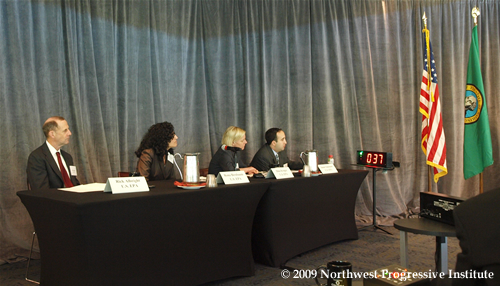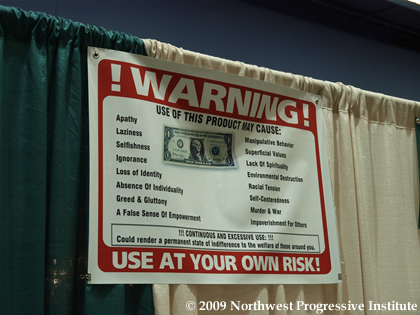Was Dr. George Tiller murdered by a right wing eliminationist? Looks like it...
President Obama issued a terse statement a short time ago, saying:
I am shocked and outraged by the murder of Dr. George Tiller as he attended church services this morning. However profound our differences as Americans over difficult issues such as abortion, they cannot be resolved by heinous acts of violence.Lauren Simonds, who leads NARAL Pro-Choice Washington, declared:
Dr. Tiller’s murder is shocking and gut-wrenching news; our hearts go out to his family during this devastating time. Having previously worked in family planning clinics, I had the opportunity to meet Dr. Tiller on several occasions.We don't yet know who is responsible for killing Dr. Tiller, or what his or her motive was. But as Sara Robinson writes at Orcinus, it's not unlikely that Dr. Tiller was murdered by a right wing eliminationist.
Despite the constant threats, the malicious protesters, the vandalism to his clinic, and the relentless political and legal attacks, Dr. Tiller refused to retreat and continued to provide women’s health care. He was truly a brave man, and we are deeply saddened by his death.
As I write this, police have a suspect in custody for Dr. Tiller's murder. There's no word yet on who the perpetrator is, or what motivated him; but it's a pretty sure bet that as the story comes out, he'll be found to be an anti-abortion True Believer. The fact that this killing happened on the sixth anniversary of Eric Rudolph's capture bears this out. The date was chosen with a message in mind. It seems very likely that the venue was, too.Cue the inevitable right wing excuse-making machine.
I've often said that fundamentalism begins the minute you decide you have the One True Right and Only Way - and that you have a God-given duty to impose that way on the rest of the world. Because of this, fundamentalists have never been willing to recognize the legitimacy of other faiths. And certain factions on the far right have never had qualms about vandalizing mosques or synagogues in order to harass Muslims and Jews into political and social silence.
But they used to leave Christian churches pretty much alone. The fact that this shooting occurred in a church (again) suggests that this tactic is now being tried out on more closely related faith groups whose views don't comport with the fundamentalist party line. As Dave has often pointed out, bringing violence to houses of worship is usually an overtly eliminationist act. They are trying to terrify liberals by making us feel at risk and unsafe inside our own spiritual sanctuaries - the very places we go to feel the most security and peace. This is terrorism, plain and simple - Christian fundamentalist terrorism, committed by people Sam Smith has started referring to as "Jesus's Jihadis."
We'll hear phrases such as "we don't know all the facts yet" (true, but people who haven't been indoctrinated by right wing hate talk don't walk into churches on Sunday mornings and shoot doctors who happen to provide reproductive health services to women) or, "It was just one person" (as if the hate speech, bullying, and targeting exacted by right wing talking heads has absolutely nothing whatsoever to do with the killer's decision to commit this act.)
And of course we'll also hear "He got what was coming to him", undoubtedly from people who consider themselves Christians. What is it about the teachings of Jesus that these right wing fundamentalists just don't get?
Are they not intelligent enough to comprehend the New Testament? Did they just gloss over the part about "Love thy neighbor as thyself"?
You have heard that it was said, 'Love your neighbor and hate your enemy.' But I tell you: Love your enemies and pray for those who persecute you, that you may be sons of your Father in heaven. He causes his sun to rise on the evil and the good, and sends rain on the righteous and the unrighteous.Did they decide the part about showing mercy wasn't applicable to them?
- Matthew 5:43-45
If you love those who love you, what credit is that to you? Even 'sinners' love those who love them. And if you do good to those who are good to you, what credit is that to you? Even 'sinners' do that. And if you lend to those from whom you expect repayment, what credit is that to you? Even 'sinners' lend to 'sinners,' expecting to be repaid in full. But love your enemies, do good to them, and lend to them without expecting to get anything back. Then your reward will be great, and you will be sons of the Most High, because he is kind to the ungrateful and wicked. Be merciful, just as your Father is merciful.The Gospels, like the U.S. Constitution, are evidently just scraps of paper to these people, documents that they can wave arrogantly in other people's faces, which ironically contain wisdom they have never bothered to absorb.
- Luke 6:32-36
UPDATE: Tiller's murderer has been identified as Scott Roeder. Daily Kos has more on his background. As Hunter notes:
So a bombmaker, tax protester, member of the "sovereignity" movement, anti-abortion zealot and Operation Rescue member: the arrested suspect manages to fit every stereotype of right-wing militia teabagger.It figures. Speaking of Operation Rescue, founder Randall Terry doesn't seem the least bit sorry that George Tiller is dead.
Attorney General Eric Holder has announced he is dispatching United States Marshals to offer protection to other doctors and clinics that offer reproductive health services around the country. Good to hear.












